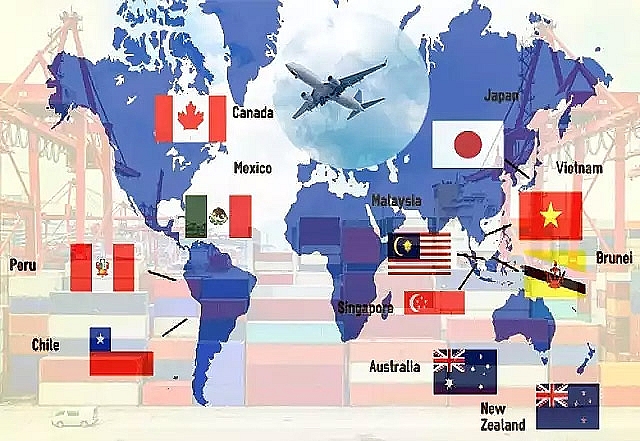Bringing Vietnam’s laws up to speed with CPTPP
 |
| Bringing Vietnam’s laws up to speed with CPTPP, source: internet |
Last Monday, with 100 per cent of votes in favour (469 votes), the National Assembly (NA) adopted the Comprehensive and Progressive Agreement for Trans-Pacific Partnership (CPTPP), making Vietnam the seventh nation to ratify this 11-member hallmark deal, after Australia, Canada, Japan, Mexico, New Zealand, and Singapore. Vietnam has been negotiating the deal for eight years before it could be inked on March 8, 2018.
The CPTPP was adopted in line with the provisions stipulated by the country’s 2013 Constitution, the 2014 Law on the Organisation of the National Assembly, and the 2016 Law on Treaties, according to the NA Standing Committee.
The CPTPP’s remaining member states include Brunei, Chile, Malaysia, and Peru, which are expected to ratify the deal in the near future.
The CPTPP will officially take effect on December 31, 2018, as one of its provisions state that it will enter into force 60 days after at least 50 per cent of the original signatories have completed national ratification procedures. On October 31, 2018, Australia was the sixth nation to pass this deal.
According to the NA Standing Committee, after the ratification, and within 15 days after the Ministry of Foreign Affairs announces that the deal will officially take effect, the government will order the Ministry of Industry and Trade to collaborate with relevant ministries and stakeholders to create a detailed plan of the “proactive, full, and efficient” implementation of the CPTPP.
The key contents of this plan will include the reviewing and amending of the country’s laws to ensure compliance with the CPTPP. The plan also includes the dissemination of the deal’s contents to the public, and the issuance of a number of solutions to support enterprises to improve their competiveness so that they can effectively take advantage of all opportunities brought about by the CPTPP, as well as weather all challenges during the implementation.
The NA’s resolution on CPTPP adoption released last week stated that the NA assigns the government, the People’s Supreme Court, the Supreme People’s Procuracy of Vietnam, and other relevant organisations and agencies to review laws and legal documents so that the authorised agencies can revise them.
“This is aimed to ensure the consistence of Vietnam’s law system and also ensure the right roadmap in implementing commitments under the CPTPP,” the resolution stated.
Recently, ministries and agencies have conducted the review of legal documents. Preliminary results showed that 265 legal documents must be reviewed, while seven laws will have to be amended, including the Labour Code, the Criminal Code, the Criminal Procedure Code, and the laws on Anti-Corruption, Intellectual Property, Insurance Business, and Food Safety.
“The prime minister will be responsible for approving and directing relevant organisations and agencies at the central and local levels to deploy plans to implement the CPTPP,” said the resolution.
In addition, “The government will require relevant ministries and agencies to complete all procedures to ratify the CPTPP and announce the time for it to take effect in Vietnam,” the resolution noted.
| Marko Walde Chief representative, German Industry and Commerce Vietnam
On behalf of the German Industry and Commerce Vietnam, I think that the CPTPP, as a quite comprehensive agreement, will offer Vietnam not only trade and investment opportunities, but also a chance to modernise and bring its labour law, penal law, anti-corruption law, and the intellectual property rights policy in line with international standards. This will certainly have a positive effect on the ratification of the free trade agreement between the EU and Vietnam. The CPTPP is a high-quality agreement which includes 15 per cent of global trade, as well as more than 13 per cent of the global economy, tantamount to $10 trillion. The agreement will also affect global value chains and is expected to help Vietnam expand exports and join global value chains more deeply. About 66 per cent of tariff lines will be eliminated immediately after the CPTPP takes effect, which will rise to 86.5 per cent three years after the deal comes into force, and 97.8 per cent after 11 years. The sectors expected to benefit the most are textile, footwear, chemicals, plastics, transport vehicles, and machinery. The CPTPP will provide greater market access to Vietnamese firms but also open up the country to foreign products, increasing competition. We also see challenges for Vietnamese products, in IPR protection, global competitiveness, and the origins of production materials. I strongly recommend that Vietnamese companies hurry up and increase their competitiveness to make the best use of the incentives offered by the CPTPP. Moreover, the CPTPP opens up business opportunities for participants but also for German companies, since many of them already operate and invest in countries of the CPTPP. Just as Asian members, German companies may exploit the agreement under specific conditions and the German Industry and Commerce Vietnam is pleased to accompany businesses from both countries on the path to success both in Vietnam and in Germany. Simon Matthews Country manager, ManpowerGroup Vietnam, Thailand, and Middle East
The National Assembly’s recent ratification of the CPTPP marked a milestone for Vietnam’s economic and human resources development. Starting from 2020, the CPTPP is expected to create 17,000-20,000 new jobs each year for Vietnamese people. The CPTPP will also open the doors for the products of other member countries of the CPTPP to enter the Vietnamese market, meaning that Vietnamese businesses and labourers will have to face stiffening competition in their home market. Despite the abundant and stable workforce, the quality of Vietnamese manpower remains a matter of special concern. Vietnam’s labour productivity stands at $4,019, only a third of Thailand’s ($11,633). Moreover, although Vietnam has 57.7 million people of working age, only 11 per cent are highly skilled, while 89 per cent are unskilled or low skilled. English proficiency is another concern as only 5 per cent of the total workforce can use English. In order to benefit from the huge opportunities from the CPTPP, Vietnamese businesses should invest in a long-term human resources development strategy to equip workers with the necessary skills to increase their productivity and competitiveness in the deepening global integration. Pham Hong Hai , CEO, HSBC Vietnam
Opportunities arriving from the CPTPP for international banks like HSBC will be vast. Our unique global network means we are a one-stop shop for clients to rely on when they want to access new markets. We can help connect them with the right partners and potential business opportunities within these markets. The CPTPP will speed up investment and trade among members and HSBC will benefit from this. Besides, foreign investors who are looking to expand into Vietnam will choose HSBC for the services that they currently enjoy in their home countries and also for the local expertise and knowledge that we can provide. Challenges for us, meanwhile, would involve very quick global policy developments, some of which can create headwinds. Banks and businesses alike ought to identify a proper strategy in order to develop sustainably or what they should change and adapt on a daily basis against this context. To take advantage of trade pacts like the CPTPP or the EVFTA, foreign enterprises in Vietnam and Vietnamese companies need to increase their scale and connections amongst each other. They must improve efficiency via investing in both technology and people to take advantage of opportunities in their supply chains. HSBC Vietnam, as the leading international bank, will continue our role as the bridge between investors and the markets they want to expand into. We will also help investors with the opportunities they want to reap, while enhancing investment in technology to provide clients with better and more convenient banking solutions in line with global standards. Ben Gray , Director of Capital Markets, Cushman & Wakefield
At Cushman & Wakefield, we see only opportunities from the CPTPP, such as the removal of tariffs on goods traded between member states and the improved access to over half a billion people for Vietnamese producers. This has enabled Vietnam to project a 35 per cent increase in exports by 2025. Producers will need to expand and acquire new facilities as they increase production led by the increased access to CPTPP markets. Supply chains will need to be streamlined and improved, thus requiring new distribution and logistics centres to be built, opening opportunities for Cushman & Wakefield’s industrial and logistics platform to advise producers and third-party logistics (3PL) on strategy and acquisitions. We do not foresee much, if any, downside for our business caused by the ratification of the CPTPP. Jazreel lim, President, Singapore Business Association of Vietnam
Vietnam remains attractive for Singaporean investors. As shown in a recent survey by the Singapore Business Association of Vietnam, around 77 per cent of Singaporean firms plan to expand abroad, with Vietnam being one of the top three choices. Specifically, around 76 per cent of the interviewed said that they have invested in Vietnam – the fourth highest rate, just behind Malaysia, Indonesia, and Thailand – while 30 per cent expect to expand business in Vietnam in the next two years – only behind Indonesia and Malaysia. Going forward, the CPTPP is expected to bring a new wave of investment from Singapore to Vietnam. The pact will create one of the world’s largest free trade blocs with a combined market of 499 million people and GDP of around $10.1 trillion, accounting for 13.5 per cent of the global GDP. |
What the stars mean:
★ Poor ★ ★ Promising ★★★ Good ★★★★ Very good ★★★★★ Exceptional
 Tag:
Tag:
Themes: CPTPP
Related Contents
Latest News
More News
- MAE names big 10 policy wins in 2025 (February 06, 2026 | 08:00)
- US firms deepen energy engagement with Vietnam (February 05, 2026 | 17:23)
- Vietnam records solid FDI performance in January (February 05, 2026 | 17:11)
- Site clearance work launched for Dung Quat refinery upgrade (February 04, 2026 | 18:06)
- Masan High-Tech Materials reports profit: a view from Nui Phao mine (February 04, 2026 | 16:13)
- Hermes joins Long Thanh cargo terminal development (February 04, 2026 | 15:59)
- SCG enhances production and distribution in Vietnam (February 04, 2026 | 08:00)
- UNIVACCO strengthens Asia expansion with Vietnam facility (February 03, 2026 | 08:00)
- Cai Mep Ha Port project wins approval with $1.95bn investment (February 02, 2026 | 16:17)
- Repositioning Vietnam in Asia’s manufacturing race (February 02, 2026 | 16:00)



























 Mobile Version
Mobile Version